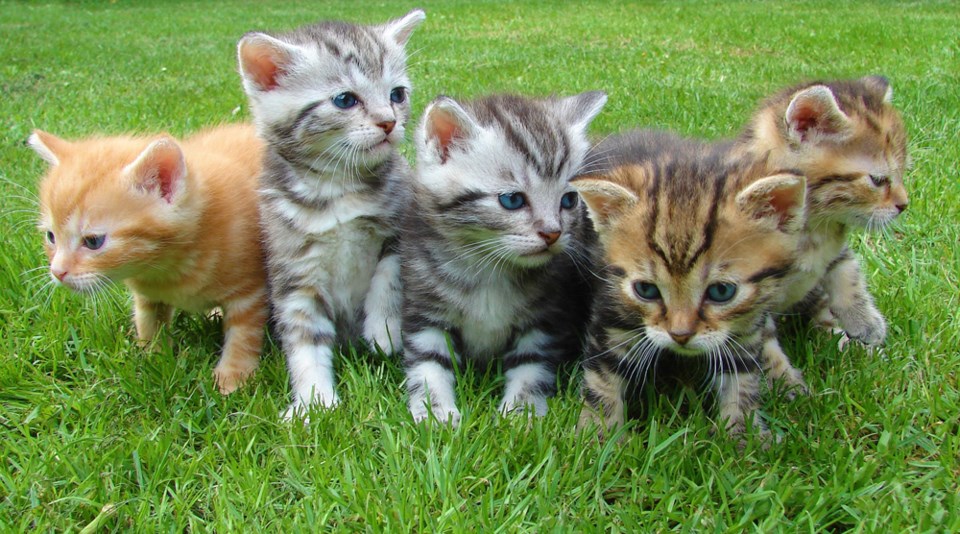Squamish pet owners face lots of choices when it comes to their pets these days. What food, accessories and toys to buy, how much exercise to give them and what vaccines their fur-babies need.
When it comes to their feline family, vaccines are essential.
Vaccines stimulate the body’s immune system to form disease-fighting cells and antibodies that help fight disease off.
Cat vaccines contain viruses that have been killed or altered in some way to make them safe to be administered.
They fully protect the cat from the targeted diseases. In a small percentage of cases, the vaccines are unable to adequately protect but reduce the severity or duration of the disease. When given to young kittens, protection from their mothers (via antibodies in the milk) interferes with the vaccine, so multiple doses of vaccine need to be given. For some diseases, this protection declines until 20 weeks of age, making it important to boost the vaccine every three to four weeks until five months of age.
What diseases can vaccines protect my cat from?
The veterinary community agrees all cats should be vaccinated against diseases that are widespread, cause serious illness, and/or are highly contagious. These vaccines are termed as “core” vaccines, designed to be recommended to be administered to all cats.
Other vaccines may be recommended based on the risk a particular disease poses to an individual cat (non-core vaccines).
Core vaccines
Feline panleukopenia (Cat flu/cat distemper):
Panleukopenia is a potentially fatal viral disease that causes vomiting, diarrhea, severe dehydration, fever, and sudden death. Kittens born to infected cats may suffer permanent brain damage.
Vaccines against panleukopenia provide excellent protection. This vaccine is generally given as a combination vaccine along with feline viral rhinotracheitis and calici viruses.
Feline viral rhinotracheitis (Herpes virus) and calicivirus:
These organisms infect the airways of cats, cause runny eyes and nose, sneezing, mouth ulcers, and sometimes a reduced appetite. Vaccines against these “cold” viruses may help increase resistance to infection and reduce the severity of a disease.
Rabies:
All mammals, including humans, are at risk of contracting rabies, which is almost invariably fatal. Rabid pets may display a “dumb” form that is characterized by listlessness, weakness, and paralysis, or the “furious” form of rabies characterized by abnormal aggression. In some parts of Canada, where risk is high, vaccination of pets is mandatory.
Non-core vaccines for cats
Feline Leukemia Virus:
This virus causes a multitude of disorders from tumours, (including leukemia), to bone marrow suppression, to silent infection, although some infected cats may not show clinical signs for several years. All kittens under one year of age should be vaccinated against feline leukemia virus (FeLV) because they are at greatest risk for infection. Adult cats that go outside or that live with any FeLV-infected cat should be vaccinated.
Chlamydia virus:
This virus causes conjunctivitis and can potentially cause conjunctivitis to human beings as well, especially to immune-compromised people. The prevalence and spread of the disease are higher in multi-cat households. Vaccination against C felis is considered non-core. Vaccination may potentially be considered as part of a control regime for cats in multiple-cat environments where infections associated with clinical disease have been confirmed.
How often should my cat receive vaccinations?
Your veterinarian will develop a vaccination protocol suited to your pet. Generally, all cats receive a series of vaccinations as kittens that are completed by four to five months of age, and their first booster is given a year later. Subsequent boosters may be given every year or every three years, depending on the vaccine.
Regardless of your cat’s infectious disease risk, the Canadian Veterinary Medical Association (CVMA) recommends an annual physical examination and consultation as the cornerstone of preventive care for your cat, with twice-yearly examinations for senior cats. More frequent examinations may be needed for cats with special needs or disease conditions.
Pets age much faster than people in the same amount of time; an annual “check-up” allows your veterinarian to early detection and management of illnesses such as dental disease, diabetes, hyperthyroidism and kidney failure that may develop as your cat ages. Certain breeds may be predisposed to health problems even at an early age. In addition, an annual visit gives you an opportunity to discuss other topics such as behaviour, nutrition, parasite control and home care of your cat.
Are vaccines safe?
Although vaccines must undergo safety trials to receive licensing in Canada and are considered very safe, vaccines can still cause reactions in a very small number of pets.
Most commonly, cats (like children) may feel tired, may run a fever for 24 hours after vaccination, and may not eat as well. Treatment is seldom required. In some cats, a small, non-painful lump may form at the site where the vaccine was injected; usually disappearing within four weeks. Again, treatment is usually not needed.
If a lump persists for three months, grows larger than two centimetres in diameter or continues to grow beyond one month after injection, ask your veterinarian to evaluate it. Injection site sarcomas are very rare but should be identified early.
Very rarely, a cat will develop facial itchiness, or a generalized allergic reaction (anaphylaxis), accompanied by vomiting, diarrhea, breathing difficulties, and extremely rarely, collapse. Should any of these occur, contact your veterinarian immediately. Anaphylactic reactions are rarely fatal if treated in a timely fashion.
Veterinarians agree that appropriate vaccination by far outweighs any rare risks.
Are there alternatives to vaccination?
No. Despite the very occasional risks associated with vaccination, it is widely accepted that vaccination plays an important role in the protection of cats from these serious diseases.
Editor's note: Jasdeep Grewal is a Veterinarian with Squamish’ Alpenlofts Veterinary Hospital




